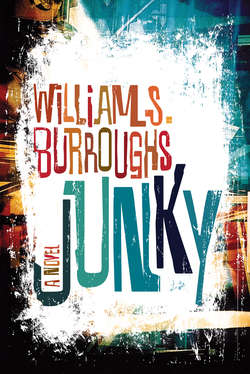Junky

Реклама. ООО «ЛитРес», ИНН: 7719571260.
Оглавление
William S. Burroughs. Junky
Отрывок из книги
by William S. Burroughs
Junky (1953)
.....
Appendix 4, Ginsberg’s “Appreciation” from April 1952 (previously published in Deliberate Prose: Selected Essays, 1952–1995), is no less interesting for being full of factual errors about Burroughs’ life. In fact, the contrast it makes with the Prologue by Burroughs that Ace did publish is intriguing, especially if, as the internal evidence suggests, Burroughs modeled his own autobiographical sketch on Ginsberg’s draft. This is true for many local details: like Ginsberg, Burroughs would mention Gide and Baudelaire among his reading, but not Cocteau’s Opium (for reasons I suggested above) or W. B. Yeats’ A Vision (a work of philosophy too recondite and eccentric); Burroughs would keep the finger-cutting incident, but not the shooting of Joan; and the writing of his first mature attempt at fiction, “Twilight’s Last Gleaming” (described by Ginsberg as a “20-page playlet”), would also be left out, along with any suggestion of a literary background to Junky. Equally, this piece is interesting for showing Ginsberg’s immediate grasp that Burroughs had written “an important document”; “an archive of the underground.” On the other hand, it also shows how bound Ginsberg was, or felt he had to be, by the language of moral judgment (speaking of “subterranean vices” when he meant homosexuality) that characterized the early 1950s.
One final point is worth noting. This only hints at the efforts Ginsberg made to promote Burroughs’ novel, at a time when few were willing. Planning to have it appear under the names of Kerouac and John Clellon Holmes (both already recognized as Beat Generation figures), Ginsberg even wrote a gossip column piece to coincide with publication, intended for David Dempsey in The New York Times—only to have Kerouac angrily refuse to lend his name to it (either out of fear of guilt-by-association with narcotics, or because of his on-off literary rivalry with Holmes). Ginsberg’s tireless support for Junky cannot be overstated.
.....